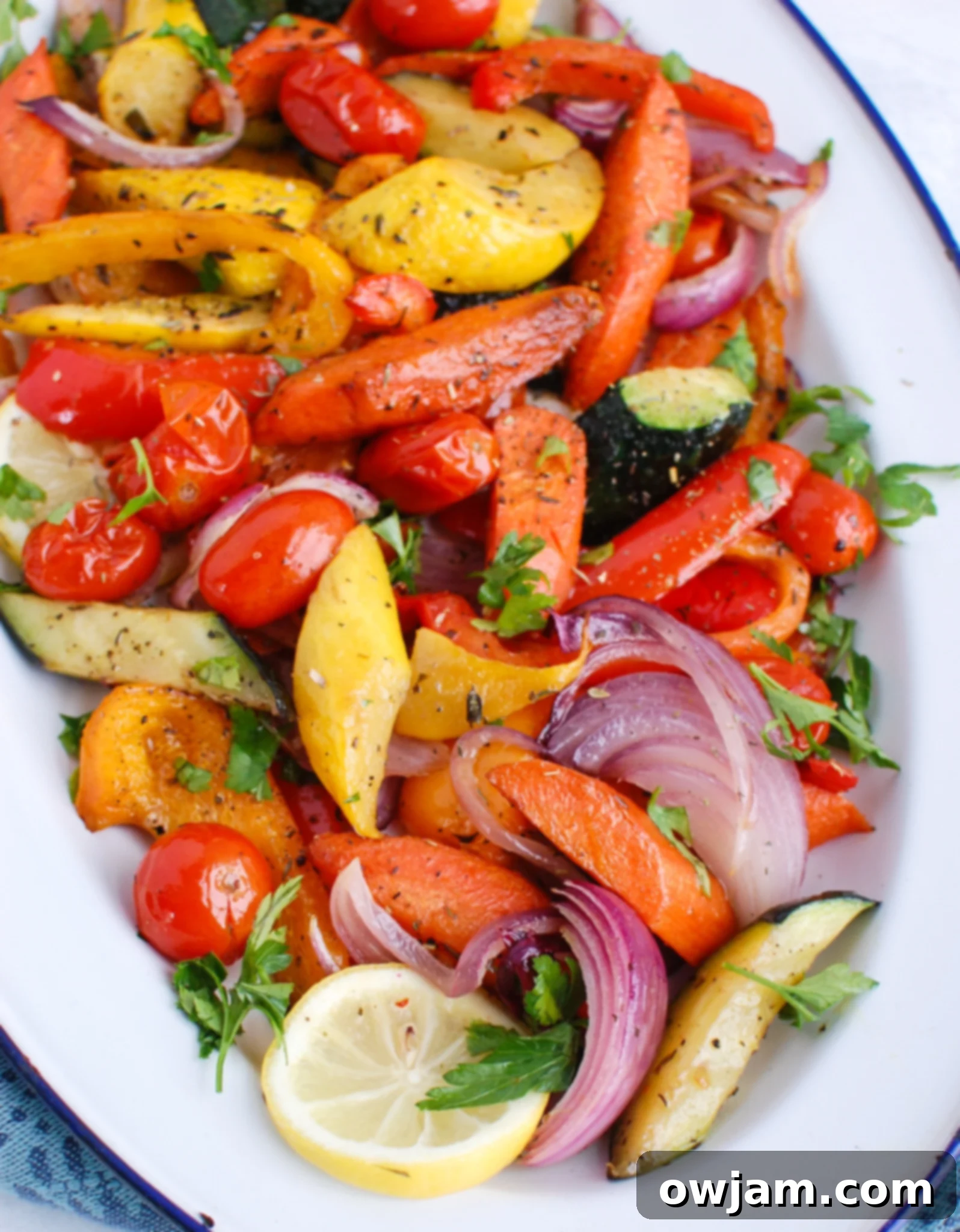Delicious Mediterranean Roasted Vegetables: Your Go-To Healthy Side Dish
Dive into the vibrant, sun-kissed flavors of the Mediterranean with this incredibly simple and satisfying recipe for Mediterranean Roasted Vegetables. Roasting is a magical cooking method that brings out the natural sweetness and depth of vegetables, transforming a humble collection of produce into a gourmet experience. Imagine a colorful medley of crisp-tender vegetables, perfectly seasoned with aromatic oregano, earthy thyme, and a bright squeeze of fresh lemon juice. This dish isn’t just a side; it’s a celebration of wholesome ingredients, offering a vegan, gluten-free, and incredibly healthy addition to any meal.
Whether you’re looking for the perfect accompaniment to grilled meats, a flavorful base for a nourishing rice bowl, or simply a light and satisfying meal on its own, these Mediterranean roasted vegetables fit the bill. Their versatility makes them a staple in any kitchen, promising a delightful burst of flavor with minimal effort.
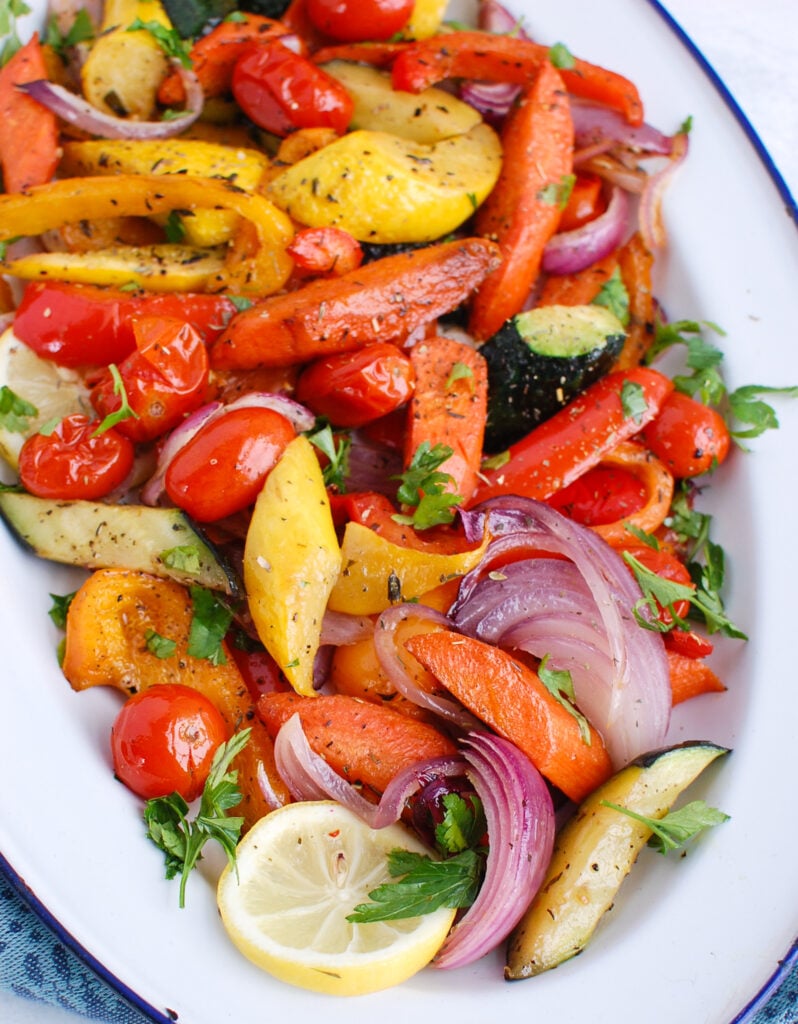
Mediterranean Roasted Vegetables: A Harmony of Flavor and Versatility
There’s an undeniable joy that comes from a plate overflowing with vibrant, colorful vegetables. Roasted vegetables are a personal favorite, a dish I enjoy preparing year-round, regardless of the season. The process of roasting caramelizes their natural sugars, intensifying their flavors and creating an irresistible aroma that fills your kitchen.
This recipe for Mediterranean Roasted Vegetables stands out due to its classic seasoning blend. We’re talking about the warm, earthy notes of oregano and thyme, perfectly complemented by rich extra virgin olive oil and the bright zest of fresh lemon juice. This combination creates a harmonious flavor profile that is both comforting and exhilarating.
The beauty of these roasted vegetables lies not just in their taste but also in their adaptability. They make a fantastic healthy addition to virtually any meal. Imagine them alongside a succulent Asian Marinated Flank Steak, or as a vibrant contrast to savory Shish Tawook Chicken Thighs. For a complete Mediterranean feast, try them with Hummus with Spiced Beef and Toasted Pine Nuts. They’re also superb simply tossed into a hearty rice bowl or enjoyed as a satisfying snack on their own.
Beyond the core seasoning, feel free to get creative! I often suggest experimenting with other beloved Mediterranean spices like sumac or za’atar. Their tangy, savory notes wonderfully enhance the roasted flavors, adding another layer of authenticity to your dish. Sumac, with its lemony brightness, and za’atar, a blend of thyme, sesame seeds, and sumac, both pair exceptionally well with the sweetness developed during roasting.
My absolute favorite part of this Mediterranean vegetable recipe is the final flourish: a generous sprinkling of fresh herbs. Chopped fresh parsley, invigorating mint, fragrant basil, or delicate dill can truly elevate the dish. These vibrant herbs add a burst of freshness and color that takes the vegetables from delicious to extraordinary, proving that a simple garnish can make all the difference.
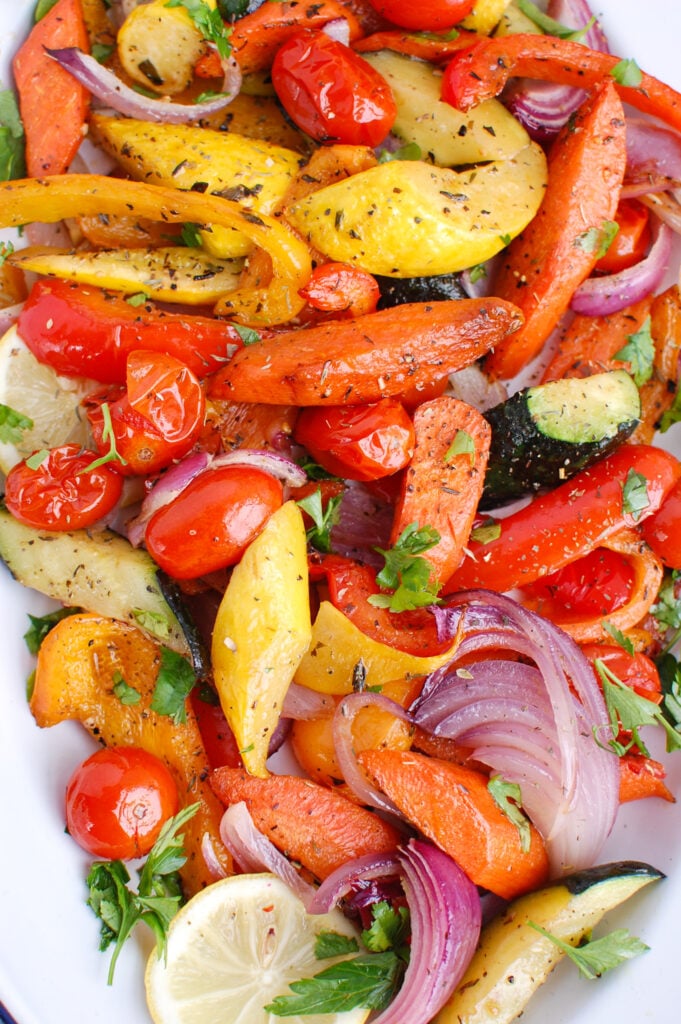
Key Ingredients for the Perfect Mediterranean Roasted Vegetables
Crafting these delectable Mediterranean roasted vegetables starts with selecting the right ingredients. Each component plays a vital role in achieving that signature Mediterranean flavor and perfectly tender texture.
- A Rainbow of Vegetables: The beauty of this dish is its flexibility. You can use almost any combination of vegetables you love or have on hand. For optimal roasting, the key is to cut them into similar sizes so they cook evenly. My go-to selection for a vibrant and flavorful mix includes zucchini, carrots, red onion, bell peppers (red and yellow for color), eggplant, summer squash, and sweet cherry tomatoes. Each vegetable contributes its unique texture and sweetness, creating a complex and satisfying bite. Don’t be afraid to add broccoli florets, cauliflower, or even potatoes for a heartier dish.
- High-Quality Extra Virgin Olive Oil: Olive oil is more than just a cooking medium here; it’s a foundational flavor component of Mediterranean cuisine. It’s crucial for achieving that desired golden-brown char and rich taste. Always opt for a good quality extra virgin olive oil – its robust, fruity notes truly shine after roasting. A generous drizzle over the finished vegetables not only adds flavor but also boosts the healthy monounsaturated fats. Remember, EVOO is packed with antioxidants and healthy fats, making it a cornerstone of a healthy diet!
- Fresh Lemon Juice: While optional, a touch of fresh lemon juice is highly recommended. It adds a wonderful brightness and subtle acidity that cuts through the richness of the olive oil and enhances the natural sweetness of the roasted vegetables. If you use Mediterranean spices like sumac or za’atar, the lemon juice complements them beautifully, tying all the flavors together. I typically start with the juice of half a lemon, but feel free to adjust to your personal preference. For an extra touch of visual appeal and flavor, try adding a few lemon slices directly to the baking sheet during roasting.
- Essential Mediterranean Spices: The magic of Mediterranean cuisine often lies in its aromatic spices. For this recipe, I lean into the classic combination of dried oregano and thyme. Oregano offers a bold, slightly bitter, and peppery flavor, while thyme contributes a delicate, earthy, and slightly floral note. If you want to further enhance the Mediterranean profile, consider adding za’atar (a Middle Eastern spice blend featuring dried thyme, sumac, and sesame seeds) or pure sumac for its distinctive tart, lemony flavor. Italian seasoning is another excellent option if you prefer a pre-blended mix.
- Vibrant Fresh Herbs: This is where the dish truly comes alive! Finishing the roasted vegetables with fresh, chopped herbs introduces a burst of vibrant flavor and a beautiful aromatic quality that transforms the entire experience. My top choices are fresh parsley for its clean, herbaceous notes, mint for a refreshing zing, basil for its sweet, peppery aroma, or dill for a delicate, slightly anisy touch. Don’t skip this step – fresh herbs are the secret to taking this dish to the next level.
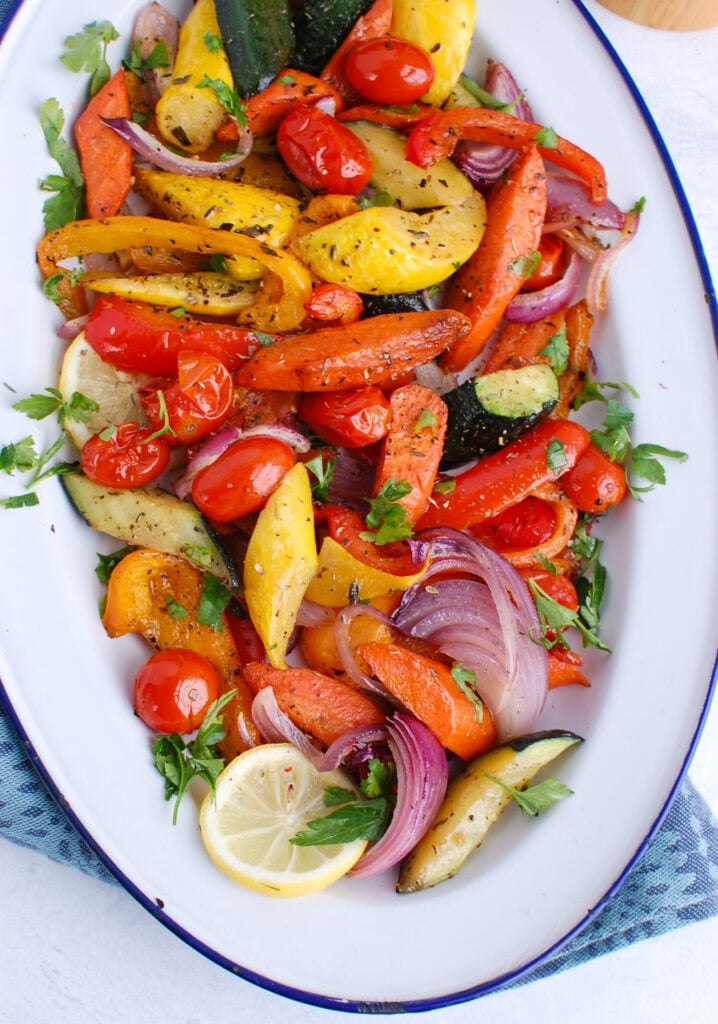
Simple Steps to Perfectly Roasted Mediterranean Vegetables
Making these delicious roasted vegetables is incredibly straightforward, perfect for even beginner cooks. Follow these easy steps for a flavorful and healthy dish:
- Prepare Your Oven: Start by preheating your oven to 425 degrees F (220 degrees C). A high temperature is essential for achieving that desirable caramelization and tender-crisp texture. While the oven heats, you can begin preparing your vegetables.
- Chop the Vegetables Evenly: Wash and cut all your chosen vegetables into bite-sized pieces. The golden rule here is consistency – aim for pieces that are roughly the same size (e.g., 1-inch chunks). This ensures they all cook at a similar rate, preventing some from becoming mushy while others remain undercooked. Place all chopped vegetables into a large mixing bowl.
- Whip Up the Flavorful Marinade: In a separate small mixing bowl or a jar with a lid (for easy shaking), combine the extra virgin olive oil, minced garlic, dried thyme, dried oregano, and your optional za’atar or sumac. Add salt and freshly ground black pepper to taste. If using, squeeze in the fresh lemon juice. Whisk or shake vigorously until all ingredients are well combined.
- Toss and Coat: Pour the prepared olive oil and spice mixture over the chopped vegetables in the large mixing bowl. Using your hands or a large spoon, toss the vegetables thoroughly, ensuring every piece is evenly coated with the aromatic marinade. This step is crucial for distributing flavor and promoting even roasting.
- Arrange on Baking Sheets: Spread the seasoned vegetables out in a single, even layer on one or two large baking sheets. It’s vital not to overcrowd the pan. If the vegetables are too close together, they will steam instead of roast, leading to a less desirable soft and soggy texture rather than a beautifully caramelized one. If necessary, use two baking sheets to give them enough space.
- Roast to Perfection: Place the baking sheets in your preheated oven. Roast for approximately 30 to 35 minutes. Halfway through the cooking time, around the 15-minute mark, give the vegetables a good stir or flip them with a spatula. This helps ensure even browning on all sides. Continue roasting until the vegetables are tender when pierced with a fork and show delightful golden-brown edges with a slight char.
- Garnish and Serve: Once roasted, transfer the vegetables to a serving platter. Garnish generously with your chosen fresh herbs – chopped parsley, mint, basil, or dill add a wonderful burst of fresh flavor and a vibrant visual appeal. Serve warm and enjoy immediately!
Expert Tips & Creative Modifications for Your Mediterranean Roasted Vegetables
Achieving perfectly roasted vegetables is an art, but these tips and modifications will guide you to consistent success and endless variations:
- Uniform Cutting is Key: The single most important tip for even roasting is to cut all your vegetables into roughly the same size. This ensures they cook at a similar rate. If some pieces are too small, they’ll burn, while larger pieces remain raw. Aim for 1-inch chunks for most vegetables.
- Don’t Forget to Toss: Throughout the roasting process, it’s beneficial to toss the vegetables at least once, usually around the halfway mark. This promotes even browning and helps to prevent sticking.
- Optimal Roasting Temperature & Texture: I’ve found that 425 degrees F (220 degrees C) is the “sweet spot” for most roasted vegetables. This high heat encourages caramelization without drying them out. While cooking time varies based on vegetable type and size, I typically check them around 25 minutes, giving them a stir at 15 minutes. For me, a perfect roasted vegetable is soft but not mushy, with nicely charred edges. This usually takes about 35-40 minutes. Trust your fork – when they’re easily pierced, they’re ready.
- Seasoning is Paramount: Spices are the soul of roasted vegetables. Beyond salt and pepper, adding a flavorful blend significantly enhances the natural taste. Oregano, thyme, sumac, and za’atar are my Mediterranean favorites. Don’t be shy about experimenting with other spices like paprika, cumin, a pinch of red pepper flakes for heat, or a good quality Italian seasoning blend.
- Consider a Sheet Pan Liner: For easier cleanup and to prevent sticking, line your baking sheets with parchment paper or a silicone baking mat. This also helps achieve better caramelization by preventing the vegetables from sticking to the metal and ensures even heat distribution.
- No Crowding Allowed: As mentioned in the instructions, resist the urge to pile too many vegetables onto one baking sheet. Overcrowding leads to steaming instead of roasting, resulting in soggy vegetables. Use two baking sheets if necessary, giving each piece space to breathe and brown properly.
- Grilling Alternative: If you prefer grilled vegetables, this recipe adapts beautifully! Instead of roasting in the oven, cook them on the grill. To prevent smaller pieces from falling through the grates, use a grill pan or thread them onto skewers. Grill over medium-high heat until tender and charred, often while your main course meat is cooking.
- Storage and Reheating: Store leftover roasted vegetables in an airtight container in the refrigerator for up to 3-4 days. To reheat, spread them on a baking sheet and warm them in a 350°F (175°C) oven for 10-15 minutes, or until heated through. This method helps them regain some crispness, unlike microwave reheating which can make them softer.
- Meal Prep Friendly: These roasted vegetables are excellent for meal prepping. Make a large batch at the beginning of the week and add them to salads, grain bowls, wraps, or as a quick side for your daily meals.
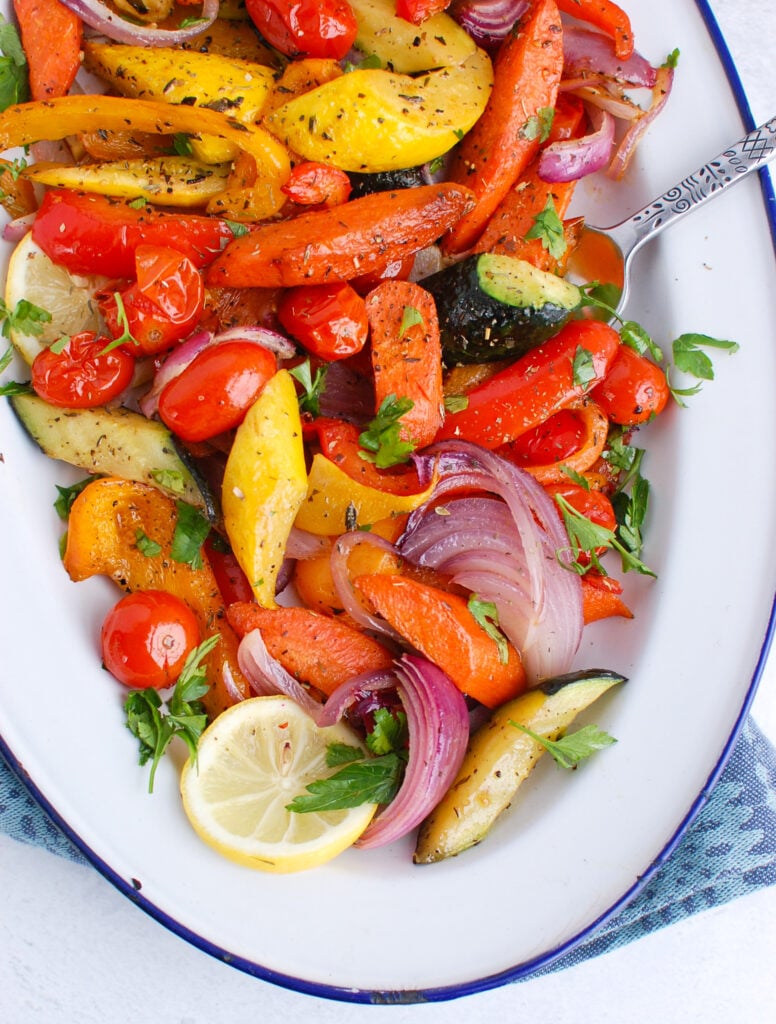
Serving Suggestions: What to Pair with Mediterranean Roasted Vegetables
The beauty of these roasted vegetables is their incredible versatility. They complement a vast array of dishes, making them a perfect healthy addition to almost any meal. Here are some of my favorite ways to enjoy them:
- Hearty Grain Bowls: Roasted vegetables shine in rice or buddha bowls. Try them with this flavorful Chicken Shawarma Rice Bowl, or alongside savory Beef Kafta Meatballs for a satisfying and complete meal. They add texture, flavor, and a punch of nutrition.
- Grilled Meats: Vegetables always pair wonderfully with grilled protein. These Greek Beef Kabobs or succulent Tandoori Chicken would be excellent choices, with the roasted vegetables providing a fresh, earthy counterpoint.
- Fresh Seafood: For a lighter, yet equally satisfying meal, pair them with seafood. If you’re a salmon lover, try them with this quick and easy 15 Minute Grilled Salmon. If a white fish is more to your liking, this tender Baked Cod with Lemon or this simple Easy Baked Fish recipe would be fantastic options.
- Pasta Dishes: Toss these warm roasted vegetables into your favorite pasta with a light sauce, some fresh herbs, and a sprinkle of feta cheese for a quick and flavorful vegetarian meal.
- Salads and Wraps: Let them cool slightly and add them to a crisp green salad, or wrap them in a warm pita with hummus and some extra fresh mint for a delicious and healthy lunch.
- Breakfast: Believe it or not, leftover roasted vegetables are amazing with eggs! Serve them alongside a scrambled egg or frittata for a savory and nutritious start to your day.
The Health Benefits of Mediterranean Roasted Vegetables
Beyond their incredible taste, Mediterranean Roasted Vegetables are a powerhouse of nutrition, aligning perfectly with the principles of the renowned Mediterranean diet. This dish offers a multitude of health advantages:
- Rich in Vitamins and Minerals: The colorful array of vegetables (bell peppers, zucchini, carrots, onions, tomatoes) provides a wide spectrum of essential vitamins (like Vitamin A, C, K) and minerals (such as potassium, magnesium, and folate) vital for overall health.
- High in Fiber: All the vegetables are packed with dietary fiber, which is crucial for digestive health, helps regulate blood sugar levels, and contributes to a feeling of fullness, aiding in weight management.
- Antioxidant Boost: Roasting enhances the antioxidant properties of many vegetables, protecting your cells from damage and reducing inflammation. Ingredients like bell peppers and tomatoes are particularly rich in antioxidants.
- Heart-Healthy Fats: Extra virgin olive oil is a cornerstone of the Mediterranean diet, known for its monounsaturated fats. These healthy fats can help lower bad cholesterol levels, reduce the risk of heart disease, and provide anti-inflammatory benefits.
- Low Calorie and Filling: This dish is naturally low in calories but high in nutrients and fiber, making it an excellent choice for anyone looking to eat healthily without sacrificing flavor or feeling deprived.
- Naturally Vegan and Gluten-Free: It’s inherently suitable for various dietary needs, making it an inclusive dish for many different eaters.
Frequently Asked Questions About Roasted Vegetables
Here are some common questions you might have about making Mediterranean Roasted Vegetables:
- Can I use frozen vegetables for roasting?
Yes, you can use frozen vegetables! However, they tend to release more water during cooking, which can make them steam rather than roast. For best results, spread frozen vegetables on a baking sheet in a single layer and roast them directly from frozen. You might need to increase the cooking time slightly and ensure your oven is hot enough to compensate for the moisture. - What are the best vegetables for roasting?
Root vegetables like carrots, potatoes, sweet potatoes, and parsnips are excellent as they become wonderfully sweet and tender. Hardy vegetables like broccoli, cauliflower, Brussels sprouts, and bell peppers also roast beautifully. Soft vegetables like zucchini, summer squash, and cherry tomatoes are great but cook faster, so consider adding them slightly later or cutting them into larger pieces. - How do I prevent my roasted vegetables from getting soggy?
The main culprits for soggy vegetables are overcrowding the pan and not using enough heat. Ensure vegetables are in a single layer with space between them (use multiple baking sheets if necessary) and roast at a high temperature (400-425°F or 200-220°C). Tossing them halfway through also helps. - Can I prepare the vegetables ahead of time?
You can chop your vegetables a day or two in advance and store them in an airtight container in the refrigerator. However, it’s best to toss them with the olive oil and spices just before roasting to prevent them from drying out or becoming overly saturated. - How do I know when my roasted vegetables are done?
They should be tender when pierced with a fork, with caramelized, slightly browned, or even lightly charred edges. Taste testing is always the best way to confirm doneness and seasoning!
More Delicious Vegetable Recipes
Vegetarian
Oven Roasted Tomatoes
Vegetarian
Bok Choy Stir Fry
Sides
Easy Bok Choy Recipe
Sides
Balsamic Roasted Mushrooms
Tried this recipe? Leave a star rating and comment below! Subscribe to my newsletter or follow me on
Facebook,
Instagram, or
Pinterest for the latest.
Mediterranean Roasted Vegetables
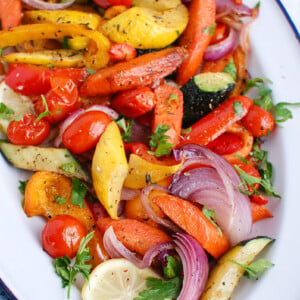
Pin
Video
Ingredients
- 1 zucchini, sliced and quartered
- 3 carrots, peeled and cut into chunks
- 1 red bell pepper, sliced
- 1 yellow bell pepper, sliced
- 1 red onion, chopped or sliced
- 1 yellow squash, sliced and quartered
- 2 cups cherry tomatoes
- 3 Tablespoons olive oil
- 4 cloves garlic , minced
- 1 teaspoon oregano
- 1 teaspoon thyme
- 1 teaspoon za’atar , or sumac {optional}
- 1/4 teaspoon salt
- 1/8 teaspoon black pepper
- 1/2 lemon, juiced {optional}
- parsley, mint, basil or dill, chopped
- Lemon slices, for serving
Instructions
-
Preheat the oven to 425 degrees F.
-
Cut all of your vegetables to your desired size making sure they are about the same size for even roasting and put them in a large mixing bowl.
-
In a small mixing bowl or mason jar combine the olive oil, garlic, thyme, oregano, za’atar or sumac, lemon juice and salt and pepper. Stir or shake to combine.
-
Toss the vegetables in the olive oil mixture.
-
On a baking sheet spread the vegetables out in an even layer. You don’t want your vegetables to be crowded so you may want to use two baking sheets.
-
Roast the vegetables for about 30 to 35 minutes or until they are soft and just starting to show some char on the edges making sure to stir the vegetables at about the 15 minute mark.
-
Garnish with fresh herbs and serve warm.
Notes
- Store leftover vegeatbles in an airtight container in the fridge for up to 3 to 4 days.
- You can modify the spices to your liking and also the amount of lemon juice.
Nutrition
Nutrition information is automatically calculated, so should only be used as an approximation.
